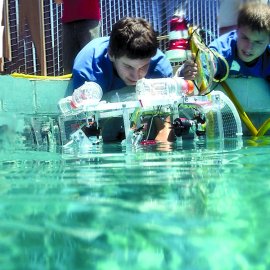Citizen Science
-
English
-
ListenPause
Welcome to World Ocean Radio… I’m Peter Neill, Director of the World Ocean Observatory. At a recent maritime conference, I heard for the first time as part of the official parlance the term “citizen science.” This was new and unexpected amongst a group of government and academic oceanographers that heretofore had dismissed such enterprise as perhaps less than rigorous or useful. An obvious reason for this was that, from among the four major American oceanographic research vessels represented, one was privately owned and funded – the R/V Falkor operated by the Schmidt Ocean Institute, founded in 2009, an organization that “supports oceanographic research projects that help expand the understanding of the world's oceans through technological advancements, intelligent observation and analysis, and open sharing of information.” The founders and senior officers of the Institute are Eric and Wendy Schmidt, also co-founders of Google. The Falkor does serious science. The vessel’s itinerary crosses many oceans; its purpose includes the development and testing of new ocean exploration technology; and its partners comprise the Center for Coastal and Ocean Mapping, the Marine Science and Technology Foundation, the French Institute for the Exploration of the Sea, and the Monterey Bay Aquarium Research Institute, among others. Clearly the Institute is a positive new opportunity for individual scientists to access the deep ocean beyond the other existing vessels. There are smaller, comparable initiatives. For example, Sailors for the Sea, an organization of yachtsman with large vessels on international voyages interested in using those passages to gather data and provide similar scientific research possibility en route. In certain cases, these sailors on their private vessels have made major contribution not just to the science but also to public awareness of the science through articles, lectures, films, social media, and connections to a network of classrooms. I recently attended such a lecture by an individual who in schooling her children aboard on a multi-year ocean journey became a leading advocate against plastic pollution and promoter of alternative products and behaviors to address a very serious and directly observed threat to marine species worldwide. Another example is the Rosalia Project, dedicated to the connection of “people of all ages to their underwater world, to inspire them to be part of the solution by using underwater robots and sonar as well as nets to locate and remove marine debris.” The project is “committed to accurate data collection and working with stakeholders (sailors, fishermen, boaters, citizens, schools, town leadership and more) to clean up and forward solutions to the problem of marine debris. Programs include underwater trash-hunting with the ROV, presentations, STEM education-based activities for grades 3-12, cleanups and research projects throughout North America.” Their current voyage, Mission Atlantic is a sailing expedition aboard American Promise, a 70-foot yacht to clean the ocean of marine debris through action, technology, education, and research. Participants will become “virtual crew” in the daily operations of the voyage with the aim to catalyze a force of 25,000 people working together to pick up some 500,000 pieces of marine debris through beach clean-ups and local action to reduce use of plastics and other non-biodegradable items that find their way into the ocean. At the conference, one project almost stole the show: OpenROV, a partnership between two highly energetic and enthusiastic young techies who had assembled a remotely operated research vehicle, fabricated from off the shelf batteries, TV camera, and other components, for a very modest price that would enable almost anyone to explore local lakes and ponds or coastal waters from a small boat to collect data, photographs, and otherwise conduct research by and for everyman. It was amusing to see the most sophisticated scientists, used to working highly evolved submersibles aboard ships coasts many thousands of dollars per day to be there, reacting with such pleasure and positivity to this simple, inexpensive device and its makers. The new and ever increasing interest in robotics among students young and old suggests real potential for future ocean science. At the recent Marine Advanced Technology Education Center’s annual student underwater robotics competition in Calfornia, fifty teams from middle and high schools, home schooling, community colleges and universities, and after-school clubs from the US, Canada, Venezuela, China, Hong Kong, Singapore, Macao, Taiwan, Saudi Arabia, the United Kingdom, Russia, and Egypt competed to design and build underwater robots associated with the operation and maintenance of ocean observing systems. It was vital, imaginative, innovative, and international. These are the young ocean citizen scientists to come. We will discuss these issues, and more, in future editions of World Ocean Radio.
"Citizen Science" is a relatively new term used to describe non-specialist research carried out by pioneering teams of private individuals, foundations and organizations utilizing the power of the internet to collaborate around the globe. In this episode of World Ocean Radio, host Peter Neill will outline a number of innovative projects and a way in which anyone can collect data and conduct research using sophisticated yet affordable submersible equipment. He'll suggest that the ever-increasing interest in robotics amongst students young and old offers real potential for future ocean science.
Peter Neill, host of World Ocean Radio, provides coverage of a broad spectrum of ocean issues from science and education to advocacy and exemplary projects. World Ocean Radio, a project of the World Ocean Observatory, is a weekly series of brief audio essays available for syndicated use at no cost by community radio stations worldwide. Contact us for more information.
Image Credit:
Marine Advanced Technology (MATE)
Resources from this Episode:
< Ocean Exploration 2020 National Forum
< R/V Falkor | Schmidt Ocean Institute
< Sailors for the Sea
< Rosalia Project
< OpenROV.com
< Marine Advanced Technology Underwater Robotics Competition
- Login to post comments



